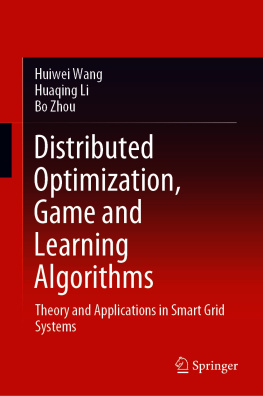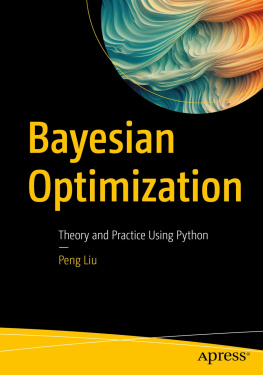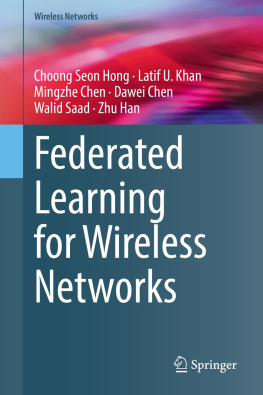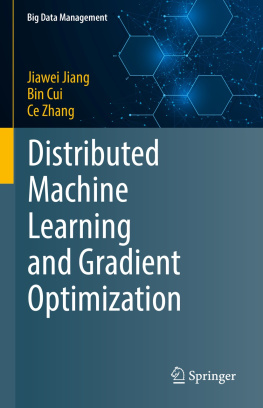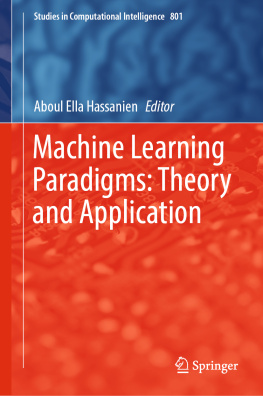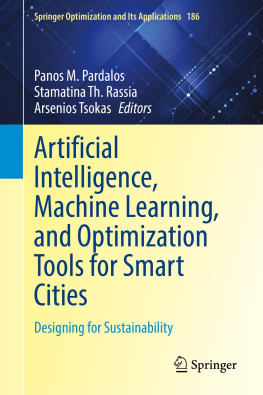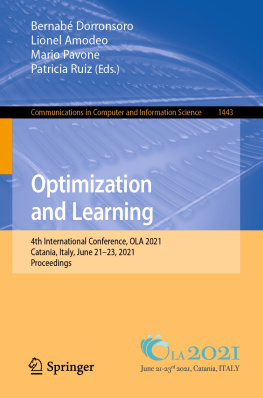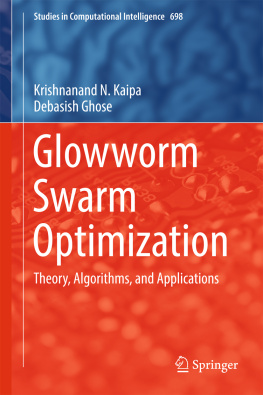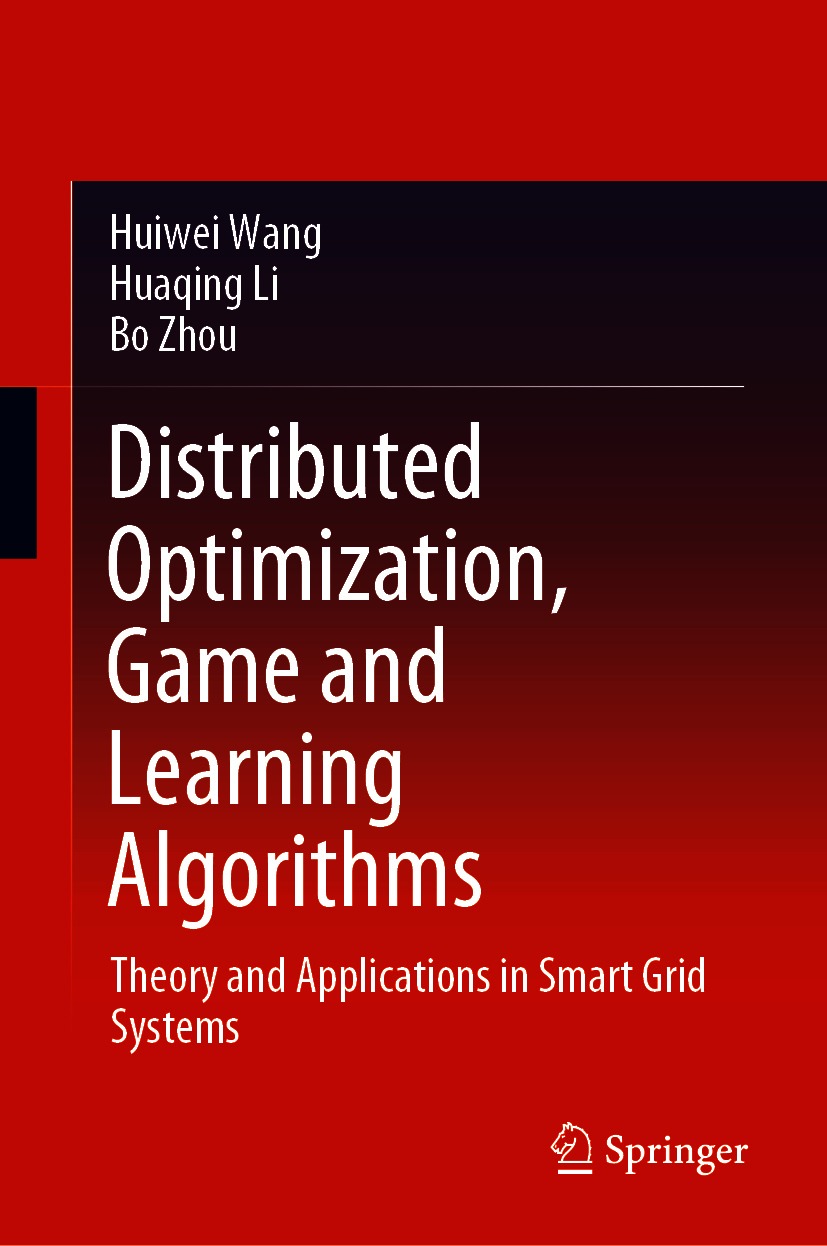Huiwei Wang , Huaqing Li and Bo Zhou
Distributed Optimization, Game and Learning Algorithms
Theory and Applications in Smart Grid Systems
1st ed. 2021

Logo of the publisher
Huiwei Wang
Southwest University, Chongqing, China
Huaqing Li
Southwest University, Chongqing, China
Bo Zhou
Chongqing Jiaotong University, Chongqing, China
ISBN 978-981-33-4527-0 e-ISBN 978-981-33-4528-7
https://doi.org/10.1007/978-981-33-4528-7
The Editor(s) (if applicable) and The Author(s), under exclusive license to Springer Nature Singapore Pte Ltd. 2021
This work is subject to copyright. All rights are solely and exclusively licensed by the Publisher, whether the whole or part of the material is concerned, specifically the rights of translation, reprinting, reuse of illustrations, recitation, broadcasting, reproduction on microfilms or in any other physical way, and transmission or information storage and retrieval, electronic adaptation, computer software, or by similar or dissimilar methodology now known or hereafter developed.
The use of general descriptive names, registered names, trademarks, service marks, etc. in this publication does not imply, even in the absence of a specific statement, that such names are exempt from the relevant protective laws and regulations and therefore free for general use.
The publisher, the authors and the editors are safe to assume that the advice and information in this book are believed to be true and accurate at the date of publication. Neither the publisher nor the authors or the editors give a warranty, expressed or implied, with respect to the material contained herein or for any errors or omissions that may have been made. The publisher remains neutral with regard to jurisdictional claims in published maps and institutional affiliations.
This Springer imprint is published by the registered company Springer Nature Singapore Pte Ltd.
The registered company address is: 152 Beach Road, #21-01/04 Gateway East, Singapore 189721, Singapore
To My Family
Huiwei Wang
To My Family
Huaqing Li
To My Family
Bo Zhou
Preface
Advances in wireless technology and computing power have necessitated the development of theory, models, and tools to cope with the new challenges posed by large-scale control and optimization problems over networks. The classical optimization methodology works under the premise that all problem data are available to a centralized server. However, this premise does not apply to large networked systems in the distributed environment motivated by applications including power systems, sensor networks, smart buildings, and smart manufacturing. In such an environment, each node (agent) performs local computation based on its own data (information) and information received from its neighboring agents through the underlying communication network, so that the large-scale control and optimization problem can be solved in a distributed manner. Eventually, the centralized optimization methodology must surely slide into decline, bringing a new distributed optimization type into being, which considers effective coordination between multiple agents, i.e., all agents cooperate to minimize a global function which is a sum of local objective functions.
This book investigates several standard hot topics in recent distributed optimization problems, such as the unconstrained optimization, constrained optimization, distributed game, and distributed/decentralized learning, etc. To emphasize the role of the distributed optimization in these topics, we focus on a simple primal (sub)gradient method, but we also provide an overview of other distributed methods for optimization in networks. Applications of the distributed optimization framework to the control of power systems are also presented. This book mainly includes, naturally, three parts. The first part deals with the distributed optimization algorithm theory, which consists of four chapters: (1) Cooperative distributed optimization in multi-agent networks with delays; (2) Constrained consensus of multi-agent systems with time-varying topology; (3) Distributed optimization under inequality constraints and random projections; and (4) Accelerated distributed optimization over digraphs with stochastic matrices. The second part, as a transition, is concerned with the distributed optimization algorithm theory and their applications in dynamic economic dispatch problems of smart grid systems, which includes two chapters: (5) Linear convergence for constrained optimization over time-varying digraphs; and (6) Stochastic gradient-push for economic dispatch on time-varying digraphs. The analysis and synthesis of distributed optimization, game, and learning algorithm theory are treated in the third part, all algorithms in this part are designed for the targeted case scenarios within smart grid systems. This part consists of three chapters: (7) Reinforcement learning in energy trading game among smart microgrids; (8) Reinforcement learning for constrained games with incomplete information; and (9) Reinforcement learning for PHEV route choice based on congestion game. Among the topics, simulation results including practical application examples are presented to illustrate the effectiveness and the practicability of the optimization, game, and learning algorithms proposed in the previous parts.
This book is appropriate as a college course textbook for undergraduate and graduate students majoring in computer science, automation, artificial intelligence, electric engineering, etc., and as a reference material for researchers and technologists in related fields.
Huiwei Wang
Huaqing Li
Bo Zhou
Chongqing, China
Acknowledgements
This book was supported in part by the National Natural Science Foundation of China under Grants 61773321 and 61803056, in part by the Fundamental Research Funds for the Central Universities under Grant XDJK2018B013, in part by China Postdoctoral Science Foundation under Grant 2017M620374, and in part by the National Natural Science Foundation of Chongqing under Grant cstc2020jcyj-msxmX0057. We would like to begin by acknowledging Ziyu Sheng, Xing Liu, Lianjiao Wang, Yifan Yu, Junjie Lv, Yang Yun, and Yan Zuo who have unselfishly given their valuable time in arranging raw materials. Their assistance has been invaluable for the completion of this book. The authors are especially grateful to their families for their encouragement and never-ending support when it was most required. Finally, we would like to thank the editors at Springer for their professional and efficient handling of this book.
Contents
List of Figures

